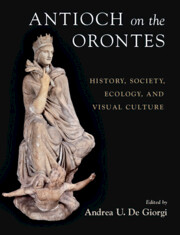Book contents
- Antioch on the Orontes
- Antioch on the Orontes
- Copyright page
- Dedication
- Contents
- Plates
- Figures
- Tables
- Contributors
- Abbreviations
- Antioch on the Orontes
- Part I Beginnings
- Part II The Making of a Capital
- Chapter 8 Antioch as a Provincial Capital
- Chapter 9 Building Programs and Natural Disasters
- Chapter 10 The City Walls of Antioch
- Chapter 11 Powerful Springs and Dangerous Torrents on Unsafe Ground
- Chapter 12 Housing in Daphne
- Chapter 13 The Antioch Mosaics
- Chapter 14 Coinage of and in Antioch in the Late Antique and Early Byzantine Periods
- Part III The People of Antioch
- Part IV Religion
- Part V Crises and Resilience
- Index
- Plate Section
- References
Chapter 9 - Building Programs and Natural Disasters
The Archaeology of Roman and Late Antique Antioch
from Part II - The Making of a Capital
Published online by Cambridge University Press: 06 June 2024
- Antioch on the Orontes
- Antioch on the Orontes
- Copyright page
- Dedication
- Contents
- Plates
- Figures
- Tables
- Contributors
- Abbreviations
- Antioch on the Orontes
- Part I Beginnings
- Part II The Making of a Capital
- Chapter 8 Antioch as a Provincial Capital
- Chapter 9 Building Programs and Natural Disasters
- Chapter 10 The City Walls of Antioch
- Chapter 11 Powerful Springs and Dangerous Torrents on Unsafe Ground
- Chapter 12 Housing in Daphne
- Chapter 13 The Antioch Mosaics
- Chapter 14 Coinage of and in Antioch in the Late Antique and Early Byzantine Periods
- Part III The People of Antioch
- Part IV Religion
- Part V Crises and Resilience
- Index
- Plate Section
- References
Summary
This chapter describes the topography and monuments of Antioch as known through the textual sources and archaeological investigations. The earthquakes that shattered the city on various occasions are also foregrounded.
Keywords
- Type
- Chapter
- Information
- Antioch on the OrontesHistory, Society, Ecology, and Visual Culture, pp. 119 - 138Publisher: Cambridge University PressPrint publication year: 2024

